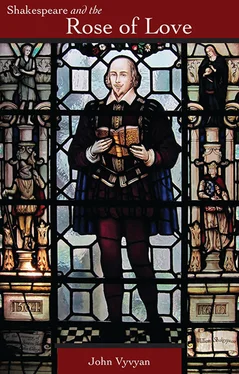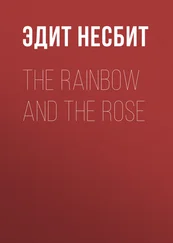It should, perhaps, be stressed that to lift a corner of the curtain is all that this book aims to do. Shakespeare is drawing on three traditions in this connection: courtly love, with the mystical associations that gathered round the Rose; Platonic love, as the Renaissance understood and in a measure created it; and the redemptive love of the Gospels. To assess his debt to the first of these is my present endeavour. I hope this will clear the way to a fuller understanding of the influence on him of the other two. But Shakespeare’s Platonism, in particular, is too large a subject to be treated as an adjunct to any other; and I will therefore defer consideration of the content of Platonic beauty in his heroines. But since his view of love and beauty was, I think, that they are the dynamic and static aspects of one reality, there is no contradiction in his using the same figure to represent them.
By-paths have to be explored; but as they are sometimes bewildering, I should like, even at the risk of seeming repetitive, to make clear the direction of the highway. I will therefore state a general proposition first. In one sense, the heroine is mainly passive, a ‘transparent Helena’, in and through whom, if all goes well, the hero discovers the celestial beauty; and the background philosophy of this is principally renaissance Neo-Platonism. In another and more dramatic sense, she is active, and then she displays the creative and redemptive power of love. These aspects cannot be separated completely, but the second will be our chief concern.
________________
*Years of travel.
* The Shakespearian Ethic , p.5 et seq.
*Baldwin, William Shakspere’s Five-Act Structure , p.239. University of Illinois Press, 1947.
*Baldwin, William Shakspere’s Small Latine and Lesse Greeke . University of Illinois Press, 1944; vol. I, p.333.
† The Shakespearean Ethic , chapter 11.
IT IS FORTUNATELY not necessary to our present enquiry to go into the vexed question of whether Love’s Labour’s Lost is Shakespeare’s first extant play. Traditionally, it has long been considered so – and dated about 1590; but among contemporary critics, there is a sharp conflict of opinion. The title-page of the first Quarto describes it as ‘Newly corrected and augmented’. It is clear that it has been augmented. There must, then, have been two versions. We may assume that the first of these was, at least, a very early work, and that important additions were made to it – possibly some years later. The augmentations show an evolution of thought, which is not the product of mere polishing, but of time. And so the tradition that places the first version – but not the full text we now possess – at the head of the list, may well be sound. Chronological certainty is not possible. But from the point of view of Shakespeare’s exploration of love, this may be taken as the beginning – ‘ Incipit Vita Nuova ’. *
The act-structure has suffered in consequence of the alterations. In the text we now have, there is great disproportion between the acts – the first having less than two hundred lines, and the last, nine hundred and forty. There may have been cuts as well as additions to the original. In spite of this, the Terentian plan is well marked. Naturally, the design was made for the simpler, earlier version; and it cannot be expected to display the deeper philosophy that was afterwards put in. It does a little to illuminate the play’s more significant ideas, and we will therefore present it briefly.
Act I
We find that the dramatic conflict of the comedy is to be between learning and love. The real battleground is, therefore, in the hearts, or minds, of the characters. And our sympathies are enlisted for love.
Act II
Learning makes a defensive move: the ladies are forbidden to enter the court. Love makes a counter-move: though shut out from the house, the ladies slip into the gentlemen’s hearts. This ends the protasis.
Act III
A knot of error is tied: the clown is entrusted with the love-letters of the lords, which he later delivers to the wrong ladies.
Act IV
The tide turns in favour of love: the young men discover each other’s attachments, and Berowne proves to them that all true learning begins with love. This ends the epitasis.
Act V
After some vicissitudes, the lovers are accepted by their ladies; but a preliminary penance is imposed on each. These penances are, in fact, a deeper sort of learning; so neither side has really lost. Some shallow notions, both of learning and of love, have been dismissed; and the profundities of each are shown as one.
Much more, it may be noticed, is implicit in this conclusion than we expect from a comedy; but Shakespeare is certainly employing the Terentian plan. He has not yet learnt to do so very deftly, and his subsequent alterations have put it sadly out of shape; but even so, it affords some clues which we must try to follow.
In this play, we find a number of young people on the threshold of life, and the question it poses could not be more appropriate. What is the aim of life? The question is framed, What is the end of study? But it is the deeper problem that Shakespeare is putting both to himself and to his audience.
The characters we meet first are the young King of Navarre, and three of his lords – the jeunesse dorée *of a Renaissance court; but the atmosphere is a blend of serious thinking and spirited fooling with which universities are familiar, and the audience easily participates in the emotional situation. Most of us have thought, at some time, that we should like to be famous, and that if we studied hard enough we might succeed; and most of us have had second thoughts, that it would be much more fun to dress up as Russians and tease the girls; and probably we have had third thoughts, that real love demands real sacrifices and that to make them is well worth while. The King of Navarre passes through these not unusual phases; and so, we may suppose, had Shakespeare; but on this familiar topic he has something out of the ordinary to say.
He does not say it, in full, until the last scene; and then it is more than we expect. Until near the end, the play had seemed to be a comedy. Abruptly we discover it is not:
Our wooing doth not end like an old play;
Jack hath not Jill: these ladies’ courtesy
Might well have made our sport a comedy.
If it is not a comedy, what is it? ‘Tragedy, history, pastoral, pastoral-comical…?’ But Polonius is mocking definitions, without providing the right one. And it may be that our usual terminology is inappropriate to Shakespearean drama; for if it leads us to assume standards with which Shakespeare was not attempting to comply, it will cause confusion. Perhaps our knowledge of his full aims is still inadequate to determine how far he fell short, as every artist must, of attaining them. But we will not pursue these questions yet. With regard to the present play, Shakespeare has simply told us that it might have been a comedy, but it is not; and we may class it provisionally as a play with a ‘message’.
The message turns out to be Shakespeare’s answer – not, of course, his final answer, but the one he had reached in sincerity as a young man – to a double question: What is the aim of life, and how is it to be attained? Whether the answer is important in itself is a matter of opinion; but since Shakespeare thought it was, it is important to an understanding of his future work: it is a foundation.
His way of persuading us that the aim he finally proposes is the right one, is to set up a number of others – plausible but inadequate – and to laugh these off the stage: what remains when we have ceased laughing, and we do cease laughing in the last act, is, in his view, the truth. As this is a method of weeding the brain which he uses elsewhere, it is worth notice. In this play, the hint is given to us by the Princess of France, when she says to her ladies:
Читать дальше











